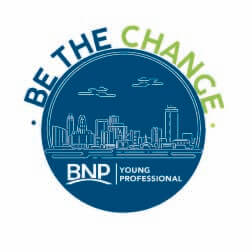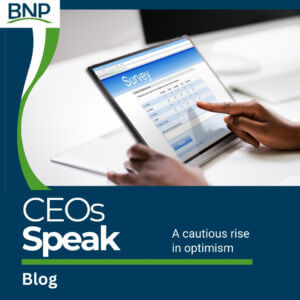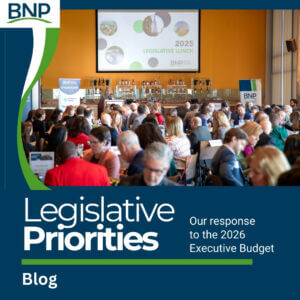7.1.21 BNP Advocacy Alert – Where are we on Infrastructure?
Blog Categories
July 1, 2021

As we enter July – Senator Schumer’s target finish line for the infrastructure package – many details remain in the air. President Biden recently joined a bipartisan coalition of Senators to announce a deal had been reached on infrastructure. But, until the ink is dry and the votes are cast, debate is far from over.
What’s the Status?
Democrats are planning to pass two major infrastructure bills. The first will be a physical infrastructure bill that will fund what comes to mind when traditionally thinking of infrastructure: roads, bridges, pipes, rails, etc. Since these investments are broadly popular, the White House and Congressional leaders plan to pass the bill with the bipartisan support needed to overcome the Senate’s 60-vote filibuster threshold.
The other bill addresses what Democrats are labelling “human infrastructure,” which includes social investments like Medicare expansion, childcare funding, climate initiatives, and housing access efforts. Since these initiatives evoke sharper ideological divisions than physical infrastructure does, a "human infrastructure" bill will not pass with a bipartisan supermajority. Instead, Democrats are planning to advance the bill via “budget reconciliation,” a procedure that only requires a simple majority for passage. Given the significant new expenditures this bill would bring, it is expected to include tax increases.
President Biden initially indicated that he will not sign the bipartisan physical infrastructure bill unless Congress also places the "human infrastructure" reconciliation bill on his desk. While he walked back these comments days later, House Speaker Nancy Pelosi echoed this sentiment, stating: “We will not take up a bill in the House until the Senate passes the bipartisan bill and a reconciliation bill. If there is no bipartisan bill, then we’ll just go when the Senate passes a reconciliation bill.
So, the key question will be: how does Senator Schumer get to 60 votes on the physical infrastructure bill? Will advancing the "human infrastructure" bill imperil his chances of getting 10+ GOP votes on the physical infrastructure bill? Will he lose support from his own conference as he tweaks the proposal to earn GOP votes?
What’s in the Physical Infrastructure Proposal?
According to the White House, the bipartisan physical infrastructure agreement would include:
- $65 billion for high-speed broadband buildout
- Funding to replace all lead water pipes and service lines
- $48.5 billion for public transit upgrades
- Funding to “to reconnect communities divided by transportation infrastructure”
- Purchase of 35,000 new electric school buses
- $21 billion to clean up Superfund and Brownfield sites
- $52 billion for flood and wildfire resilience
- Significant investment in renewable energy generation and transmission
- $678 billion in other traditional infrastructure investments as follows:
| Amount (billions) | |
| Total | $579 |
| Transportation | $312 |
| Roads, bridges, major projects | $109 |
| Safety | $11 |
| Public transit | $49 |
| Passenger and Freight Rail | $66 |
| EV infrastructure | $7.5 |
| Electric buses / transit | $7.5 |
| Reconnecting communities | $1 |
| Airports | $25 |
| Ports & Waterways | $16 |
| Infrastructure Financing | $20 |
| Other Infrastructure | $266 |
| Water infrastructure | $55 |
| Broadband infrastructure | $65 |
| Environmental remediation | $21 |
| Power infrastructure incl. grid authority | $73 |
| Western Water Storage | $5 |
| Resilience | $47 |
Source: White House
What’s in the "Human Infrastructure" Proposal?
The White House’s American Families Plan is the basis for the “human infrastructure” bill. It includes funding for:
- Two free years of community college
- Universal access to pre-kindergarten
- Tuition assistance, including increased Pell Grants, allowing DREAMers to utilize Pell Grants, and specialized assistance for students at minority-serving institutions
- Childcare cost relief
- Paid family & medical leave
- Expansions of SNAP, school meal, and summer nutrition programs
- $3 billion for maternal health
- Making permanent the Child and Dependent Care Tax Credit and the expended Earned Income Tax Credit for Childless Workers
- 5-year extension of the Child Tax Credit
- Health insurance premium reduction efforts
What can we do?
The BNP has long advocated for a federal infrastructure package. Federal investment could help the Buffalo Niagara region undertake landmark improvements, complete a backlog of smaller projects, and modernize our community for the 21st century. In the process, workers across the region would see an influx of opportunities.
Congress must not lose the moon while counting the stars. While the BNP has not weighed in on the specifics of these competing proposals, the most important outcome is an ultimate federal investment that meets the infrastructure needs of the Buffalo Niagara region.
The BNP has communicated with lawmakers about the importance of passing a comprehensive infrastructure package, and has also discussed possible projects with our federal delegation to illustrate the monumental impact this package would have if enacted.
To contact your Congressional representatives about the need to pass an infrastructure package, use our one-click tool here.
The BNP will continue to keep you informed as the Congressional infrastructure negotiations continue.
Related Posts
Where the candidates stand: Key economic issues in the Buffalo mayoral race
On Thursday, May 1, the BNP hosted a Democratic Mayoral Candidate Forum. For the first time since 2006, the City of Buffalo is electing a new mayor. The office has drawn considerable interest, leading to a crowded field of candidates running in the June 24 primary election. To help BNP members meet the candidates and learn where they stand on the issues facing our regional economy, the BNP invited the top three fundraising candidates to participate.
Empowering Young Professionals to step into advocacy
How does business advocacy actually work? And why should young professionals take interest?
Those were the driving questions behind Be The Change, a high-energy informational event hosted by the Buffalo Niagara Partnership’s Young Professionals (YP) group. Held at The Establishment, this members-only session gave attendees a behind-the-scenes look at how business advocacy shapes the regional economy, and how emerging leaders can play a role in that impact.
CEOs Speak: A cautious rise in optimism
At our recent CEOs Speak event—the only forum in Buffalo Niagara showcasing the results from the annual Upstate New York Business Leader Survey—local leaders delivered a powerful message: optimism is cautiously rising, but government intervention remains a persistent obstacle to regional economic growth.
Legislative priorities: BNP’s reaction to the Executive Budget
On February 14, we set the stage for critical discussions about the future of New York State’s economy by convening regional business leaders and policymakers, along with BNP members, at the 1970 Club in KeyBank Center for our Legislative Luncheon.




